- Home
- Ian Mcewan
Sweet Tooth Page 18
Sweet Tooth Read online
Page 18
I went through Berkeley Square, where we’d remembered the nightingale song, and turned right down Berkeley Street towards Piccadilly. By Green Park station I saw the headlines on the noon edition of the evening newspapers. Petrol rationing, energy crisis, Heath to address the nation. I didn’t care. I walked towards Hyde Park Corner. I was too upset to be hungry for lunch. There was a curious burning sensation in the balls of my feet. I wanted to run or kick. I wanted a game of tennis with a ferocious opponent, one I could beat. I wanted to shout at someone – that was it, I wanted a full-on row with Tony and then to leave him before he had a chance to leave me. The wind blew harder, right into my face as I turned into Park Lane. Rain clouds were piling up over Marble Arch, getting ready to drench me again. I walked faster.
I was passing the PO Box office so I went in, partly to get out of the cold. I’d checked only hours before and I had no real expectation of a letter, but there it suddenly was, in my hand, postmarked Brighton and yesterday’s date. I fumbled with it, I pulled the envelope apart like a child on Christmas Day. Let one thing be right today, I thought as I went to stand by the glass door to read. Dear Serena. And it was right. It was more than right. He apologised for taking his time. He liked meeting me, he had given careful thought to my offer. He was accepting the money and he was grateful, it was an amazing opportunity. And then there was a new paragraph. I brought the letter closer to my face. He’d used a fountain pen, crossed out a word, made a smudge. He wanted to impose a condition.
If you don’t mind, I’d like us to keep in regular contact – for two reasons. The first is that I’d prefer this generous Foundation to have a human face, so the money that comes to me each month is not simply an impersonal, bureaucratic matter. Second, your appreciative remarks meant a lot to me, more than I can say in a note like this. I’d like to be able to show you my work from time to time. I promise I won’t be looking for constant praise and encouragement. I’d like your honest criticism. Naturally, I’d want to feel free to ignore any notes of yours that don’t seem right to me. But the main thing is that by having your occasional input I wouldn’t be writing into a void, and that’s important if I’m starting out on a novel. As far as hand-holding goes, it won’t be much of an imposition. Just a cup of coffee now and then. I’m nervous about writing something longer, more so now that there’s some expectation laid upon me. I want to be worthy of this investment you’re making in me. I’d like the Foundation people who chose me to feel that they made a decision they can be proud of.
I’m coming to London on Saturday morning. I could meet you in the National Portrait Gallery at ten by Severn’s painting of Keats. Don’t worry, if I haven’t heard from you and you’re not there, I won’t rush to any conclusions.
Best wishes, Tom Haley
14
By five o’clock that Saturday afternoon we were lovers. It didn’t run smoothly, there was no explosion of relief and delight in the meeting of bodies and souls. It wasn’t ecstatic, the way it was for Sebastian and Monica, the thieving wife. Not at first. It was self-conscious and awkward, it had a theatrical quality, as if we were aware of the expectations of an unseen audience. And the audience was real. As I opened the front door of number seventy and showed Tom in, my three solicitor housemates were grouped at the foot of the stairs, mugs of tea in hand, clearly wasting time before making their way back to their rooms and an afternoon of legal grind. I closed the door behind us with a loud slam. The women from the north stared at my new friend with undisguised interest as he stood there on the doormat. There was a fair amount of meaningful grinning and shuffling as I made my reluctant introductions. If we’d arrived five minutes later no one would have seen us. Too bad.
Rather than conduct Tom to my bedroom pursued by their looks and nudges, I took him through to the kitchen and waited for them to disperse. But they lingered. While I made tea I could hear them murmuring in the hall. I wanted to ignore them and have a conversation of our own, but my mind was a blank. Sensitive to my discomfort Tom filled the silence by telling me about the Camden Town of Dickens’s Dombey and Son, the line north from Euston station, the colossal cutting dug by Irish navvies that forced its way through the poorest neighbourhoods. He even had a line or two by heart and his words defined my own confusion. ‘There were a hundred thousand shapes and substances of incompleteness, wildly mingled out of their places, upside down, burrowing in the earth, aspiring in the air, mouldering in the water, and unintelligible as any dream.’
At last my housemates went back to their desks, and after a few minutes we climbed the creaky stairs with our own mugs of tea. The silence behind each of their doors as we passed them on the way up seemed intensely alert. I was trying to remember whether my bed also creaked and how thick my bedroom walls were – hardly sensual thoughts. Once Tom was installed in my room, in my reading armchair while I sat on the bed, it seemed a better idea to go on talking.
At this at least we were already adept. We had passed an hour in the Portrait Gallery showing each other our favourites. Mine was Cassandra Austen’s sketch of her sister, his, William Strang’s Hardy. Looking at pictures with a stranger is an unobtrusive form of mutual exploration and mild seduction. It was an easy slide from aesthetics to biography – the subject’s obviously, but also the painter’s, at least, the scraps we knew. And Tom knew far more than I did. Basically, we gossiped. There was an element of showing off – this is what I like, this is the kind of person I am. It was no great commitment to say that Branwell Brontë’s painting of his sisters was deeply unflattering, or that Hardy told people he was often mistaken for a detective. Somehow, between paintings, we joined arms. It wasn’t clear whose initiative it was. I said, ‘The handholding has begun,’ and he laughed. It was probably then, as we linked fingers, that we assumed we would end up in my room.
He was easy company. He didn’t have the compulsion of so many men on a date (this was now a date) to want to make you laugh at every turn, or point at things and sternly explain them, or constrain you with a string of polite questions. He was curious, he listened, he offered a story, he accepted one. He was relaxed in the to and fro of conversation. We were like tennis players warming up, rooted to our baselines, sending fast but easy balls down the centre of the court to our opponent’s forehand, taking pride in our obliging accuracy. Yes, tennis was on my mind. I hadn’t played in almost a year.
We went to the gallery cafe for a sandwich and it was here that everything could have fallen apart. The conversation had moved off paintings – my repertoire was tiny – and he had started to talk about poetry. This was unfortunate. I’d told him I had a good degree in English and now I couldn’t remember when I last read a poem. No one I knew read poetry. Even at school I had managed to avoid it. We never ‘did’ poetry. Novels, of course, a couple of Shakespeare plays. I nodded encouragingly as he told me what he’d been re-reading. I knew what was coming and I was trying to think of a ready answer, with the consequence that I wasn’t listening to him. If he asked, could I say Shakespeare? At that moment I couldn’t name a single poem by him. Yes, there were Keats, Byron, Shelley, but what did they write that I was supposed to like? There were modern poets, of course I knew their names, but nervousness was whiting out my thoughts. I was in a snowstorm of mounting anxiety. Could I make the case that the short story was a kind of poem? Even if I came up with a poet, I would have to name a particular work. There it was. Not a poem in the world that I could name. Not at this moment. He had asked something, he was staring at me, waiting. The boy stood on the burning deck. Then he repeated his question.
‘What do you think of him?’
‘He’s not really my kind of …’ Then I stopped. I had only two options – to be revealed as a fraud or to own up. ‘Look, I’ve got a confession to make. I was going to tell you at some point. It might as well be now. I lied to you. I didn’t get an English degree.’
‘You went straight from school to work?’ He said this encouragingly and was looking at me in that way I reme
mbered from our interview, both kindly and teasing.
‘I’ve a degree in maths.’
‘From Cambridge? Christ. Why conceal that?’
‘I thought my opinion of your work would matter less to you. It was stupid, I know. I was pretending to be the person I once wanted to be.’
‘And who was that?’
So I told him the whole story of my speed-reading fiction compulsion, of my mother turning me away from studying English, my academic misery at Cambridge, and of how I continued reading, and still did. How I hoped he would forgive me. And how I really loved his work.
‘Listen, a maths degree is far more demanding. You’ve got the rest of your life to read poetry. We can start with the poet I was just talking about.’
‘I’ve forgotten his name already.’
‘Edward Thomas. And the poem – a sweet, old-fashioned thing. Hardly the stuff of poetic revolutions. But it’s lovely, one of the best-known, best-loved poems in the language. It’s marvellous you don’t know it. You’ve got so much ahead of you!’
We had already paid for our lunch. He stood abruptly and took my arm and propelled me out of the building, up the Charing Cross Road. What could have been a disaster was drawing us closer, even though it now meant that my date was telling me things in the traditional manner. We stood in a corner of a basement of a second-hand bookshop in St Martin’s Court, with an old hardback Collected Thomas opened by Tom for me at the right page.
Obediently, I read it, and looked up. ‘Very nice.’
‘You can’t have read it in three seconds. Take it slowly.’
There wasn’t much to take. Four verses of four short lines. A train makes an unscheduled stop at an obscure station, no one gets on or off, someone coughs, a bird sings, it’s hot, there are flowers and trees, hay drying in the fields and lots of other birds. And that was it.
I closed the book and said, ‘Beautiful.’
His head was cocked and he was smiling patiently. ‘You don’t get it.’
‘Of course I do.’
‘Then tell it to me.’
‘What do you mean?’
‘Say it back to me, everything in it that you can remember.’
So I told him all I knew, almost line by line, and even remembered the haycocks, cloudlets, willows and meadowsweet, as well as Oxfordshire and Gloucestershire. He seemed impressed and he was looking at me oddly, as if he was making a discovery.
He said, ‘There’s nothing wrong with your memory. Now try to remember the feelings.’
We were the only customers downstairs in the shop and there were no windows and only two dim bulbs, without shades. There was a pleasant dusty soporific smell, as though the books had stolen most of the air.
I said, ‘I’m sure there isn’t a single mention of a feeling.’
‘What’s the first word of the poem?’
‘Yes.’
‘Good.’
‘It goes, “Yes, I remember Adlestrop.” ’
He came closer. ‘The memory of a name and nothing else, the stillness, the beauty, the arbitrariness of the stop, birdsong spread out across two counties, the sense of pure existence, of being suspended in space and time, a time before a cataclysmic war.’
I angled my head and his lips brushed mine. I said very quietly, ‘The poem doesn’t mention a war.’
He took the book from my hands as we kissed, and I remembered that when Neil Carder kissed the mannequin for the very first time, her lips were hard and cool from a lifetime of trusting no one.
I made my lips go soft.
Later we doubled back on ourselves, crossed Trafalgar Square, towards St James’s Park. Here, as we strolled past staggering toddlers with fistfuls of bread for the mallards, we talked about our sisters. His, Laura, once a great beauty, was seven years older than Tom, had studied for the bar, had had a brilliant future, then by degrees, with this or that difficult case and difficult husband, became an alcoholic and lost everything. Her descent was complicated by some near-successful attempts at recovery, heroic comebacks in the courtroom, until drink pulled her back down again. There were various dramas that used up the last of the family’s patience. And finally, a car accident in which the youngest of her children, a five-year-old girl, lost a foot. There were three children by two fathers. Laura had fallen through every safety net the modern liberal State could devise. Now she was living in a hostel in Bristol, but the management was ready to throw her out. The children were looked after by their fathers and stepmothers. There was a younger sister, Joan, married to a Church of England vicar, who also looked out for them, and two or three times a year Tom took his two nieces and nephew on holiday.
His parents were also marvellous with their grandchildren. But Mr and Mrs Haley had lived through twenty years of shock, false hopes, embarrassments and night-time emergencies. They dreaded her next phone call and lived in a condition of constant sadness and self-blame. However much they loved Laura, however they kept alive on the mantelpiece the essence of what she had been in the silver-framed photos of her tenth birthday and degree ceremony and first wedding, even they could not deny she had become a terrible person, terrible to look at, to listen to, terrible to smell. Terrible to remember the calm intelligence, then hear her wheedling self-pity and lies and sodden promises. The family had tried everything in the way of coaxing, then gentle confrontation, then outright blaming, and clinics and therapies and hopeful new drugs. The Haleys had spent almost all they had in tears and time and money, and there was really nothing to do now but concentrate their affection and resources on the children and wait for their mother to be permanently hospitalised, and die.
In the race to such ruin as Laura’s, my sister Lucy could hardly compete. She had dropped out of her medical degree and was back living near our parents, even as she discovered in herself, through therapy, a bitter reserve of anger against my mother for arranging the abortion. In every town there’s a cadre who refuse or fail, sometimes quite happily, to move on to the next stage, the next place. Lucy found a snug community of old school friends who had returned too soon from forays on the hippie trail, or to art college or universities, and were settling down to a marginal life in their pleasant home town. Despite the crises and states of emergency, these were good years for staying out of a job. Without asking too many impertinent questions, the State paid the rent and granted a weekly pension to artists, out-of-work actors, musicians, mystics, therapists and a network of citizens for whom smoking cannabis and talking about it was an engrossing profession, even a vocation. The weekly handout was fiercely defended as a hard-won right, though everyone, even Lucy, knew in their hearts that it had not been devised to keep the middle classes in such playful leisure.
Now that I was a taxpayer with a meagre income, my scepticism about my sister ran deep. She was clever, brilliant at biology and chemistry at school, and she was kind, she had the human touch. I wanted her to be a doctor. I wanted her to want what she used to want. She lived rent-free with another woman, a circus-skills instructor, in a Victorian terraced cottage renovated by the local council. She signed on, smoked dope, and for three hours a week on Saturday mornings sold rainbow-coloured candles from a stall in the city-centre market. On my last visit home she had talked of the neurotic, competitive ‘straight’ world she had left behind. When I suggested that this was the world that supported her work-free existence she laughed and said, ‘Serena, you’re so right wing!’
While I was filling in the background and telling Tom this story I was fully aware that he was about to become a State pensioner too, on a grander scale, from the Secret Vote, that portion of government expenditure that parliament may never scrutinise. But T.H. Haley was going to work hard and produce great novels, not rainbow candles or tie-dye T-shirts. As we made our three or four turns about the park, I did feel queasy about withholding information from him, but it helped to remember that he’d visited our cut-out, the Foundation, and had approved of it. No one was going to tell him what to write or think or tel
l him how he should live. I had helped bring freedom to a genuine artist. Perhaps the great patrons of the Renaissance felt the way I did. Generous, above immediate earthly concerns. If that seems a grand claim, remember that I was feeling a little drunk and lit up by the afterglow of our long kiss in the bookshop basement. We both were. Talking about our less fortunate sisters was our unintentional way of marking our own happiness, of keeping our feet on the ground. Otherwise we might have floated off above Horse Guards Parade, away over Whitehall and across the river, especially after we stopped under an oak, still hoarding its load of rusty dry leaves, and he pressed me against its trunk and we kissed again.
This time I put my arms round him and felt beneath the tightness of his belted jeans the sinewy slenderness of his waist and, below, the hard muscle of his buttocks. I felt weak and sick, my throat was parched and I wondered if I was getting flu. I wanted to lie down with him and stare into his face. We decided to go to my place, but we couldn’t face public transport and we couldn’t afford a taxi. So we walked. Tom carried my books, the Edward Thomas and his other gift, the Oxford Book of English Verse. Past Buckingham Palace to Hyde Park Corner, along Park Lane, past my work street – which I failed to point out – then a long trudge up the Edgware Road, passing the new Arab restaurants, eventually turning right onto St John’s Wood Road, past Lord’s cricket ground, along the top of Regent’s Park and into Camden Town. There are far quicker ways, but we didn’t notice or care. We knew what we were walking towards. Mostly, not thinking about it made the walking easier.

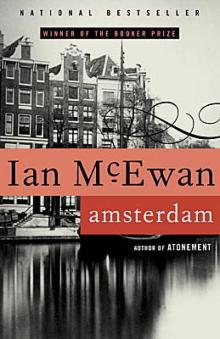 Amsterdam
Amsterdam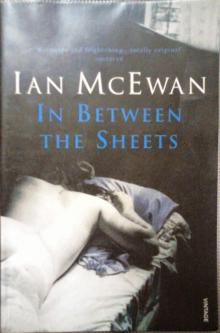 In Between the Sheets
In Between the Sheets Atonement
Atonement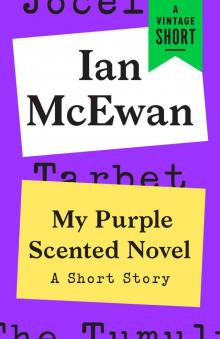 My Purple Scented Novel
My Purple Scented Novel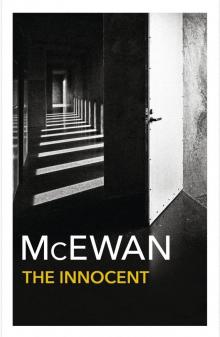 The Innocent
The Innocent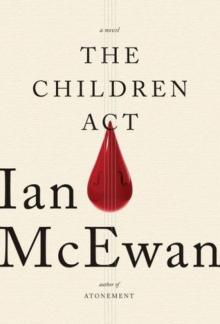 The Children Act
The Children Act Enduring Love
Enduring Love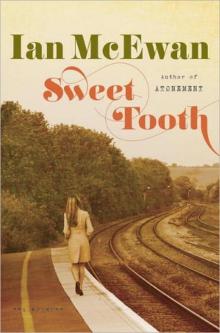 Sweet Tooth
Sweet Tooth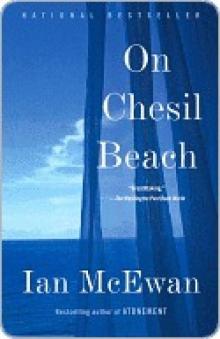 On Chesil Beach
On Chesil Beach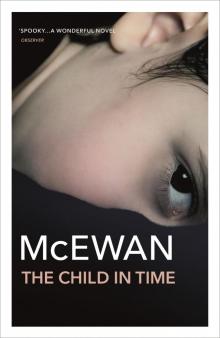 The Child in Time
The Child in Time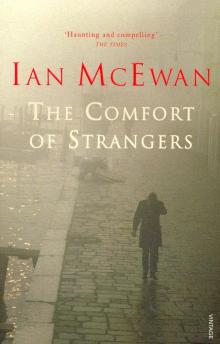 The Comfort of Strangers
The Comfort of Strangers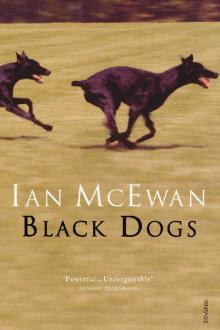 Black Dogs
Black Dogs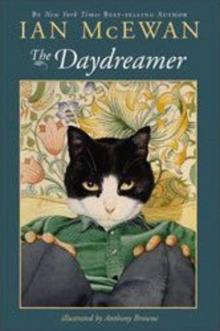 The Daydreamer
The Daydreamer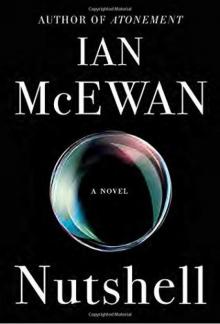 Nutshell
Nutshell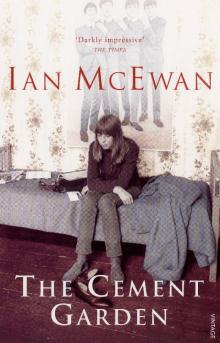 The Cement Garden
The Cement Garden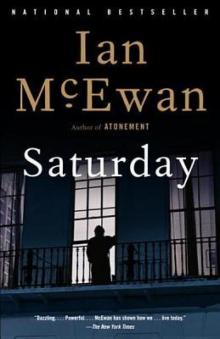 Saturday
Saturday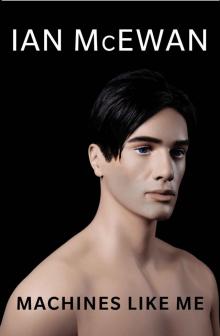 Machines Like Me
Machines Like Me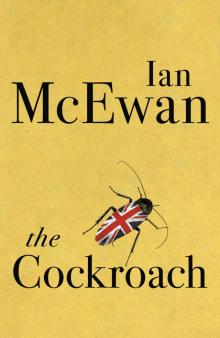 The Cockroach
The Cockroach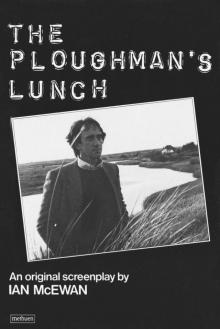 The Ploughman’s Lunch
The Ploughman’s Lunch